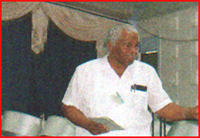 Some of us make history; some write history; some read history; and some interpret history. Sad to say, some of us distort history. Although a macro and micro comparison, America and Belize are contemporaries of the early 1920’s, according to Byron Foster, “the date of the settlement was given as 1638.” However, it is said, purportedly, that Sir Walter Raleigh and Peter Wallace visited Belize before 1620. Whether the beginning of a relationship is the engagement or the wedding may be arguable, considering the engagement as a relationship that is prospective of the wedding. A long settlement, a territorial victory on September 10th, 1798 and British colonial status in 1862 preceded a long struggle leading to our Independence in 1981.
Some of us make history; some write history; some read history; and some interpret history. Sad to say, some of us distort history. Although a macro and micro comparison, America and Belize are contemporaries of the early 1920’s, according to Byron Foster, “the date of the settlement was given as 1638.” However, it is said, purportedly, that Sir Walter Raleigh and Peter Wallace visited Belize before 1620. Whether the beginning of a relationship is the engagement or the wedding may be arguable, considering the engagement as a relationship that is prospective of the wedding. A long settlement, a territorial victory on September 10th, 1798 and British colonial status in 1862 preceded a long struggle leading to our Independence in 1981.
The most regrettable consequence of British colonialism to Belize is the legacy of the long and lingering territorial dispute; the unfounded claim by Guatemala, despite our having become an independent and sovereign nation. Now the very controversial prospect of simultaneous referenda in conjunction with Guatemala to decide whether or not to send the matter to the International Court of Justice faces us as a country. Interestingly, the most recent development is that Guatemala is now requesting a postponement of the bilaterally agreed upon date for the referenda. However, should the matter go to the ICJ and the decision is for any transference of, or interference with the Belize we have known, our territorial integrity, repeatedly reaffirmed by the slogan, “not one square centimetre”, and our much loved patriotic song, “God’s Goodness Gave this Land to Me” will be history, unless God intervenes and defends us. And will He not? He has done it before!
There are a few controversial aspects in the history of Belize. One of them is the veracity of the visit of Sir Walter Raleigh and Peter Wallace before 1620. Another is the frequent bone of contention regarding The Battle of St. George’s Caye. Distortions and negations of unwelcomed history by nations, even to the point of rewriting history, are not new. A classic example is in an interview by satellite in 1977 when Walter Cronkite questioned Anwar Sadat about the Israelites in Egyptian bondage. His response was, “There is no record in our history that Jews were held slaves in Egypt.” That is a most audacious national statement in the face of scriptural and oral history.
As humans, we make mistakes, but when we do it is good to admit them, and correct them. I made a glaring mistake recently. It was not in ignorance but in inadvertence. In my Easter Message 2013, I was making a point on terminology and quoted the sentence, “What’s in a name?” Those words belong to Shakespeare’s “Romeo and Juliet.” My inadvertent error was to make the reference to “Julius Caesar” which was a different play by Shakespeare. The mistake dawned on me after the Easter Message was published. Speaking for the nation of Egypt, Sadat’s statement could hardly have been a mistake, but to the Jews and the Christian world, it is a resounding historical dishonesty. Nor should our own history of Belize be distorted, negated or neglected by any historical publication that is flawed.




